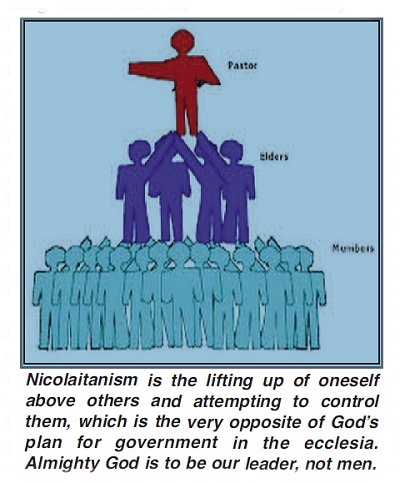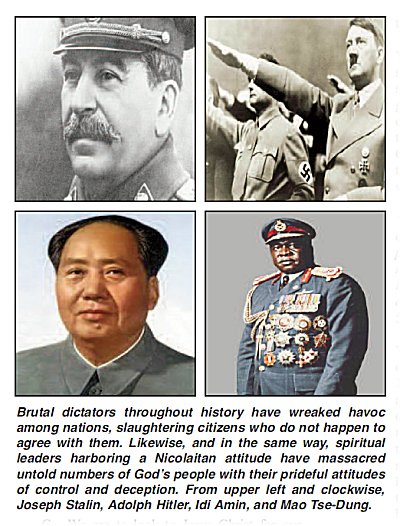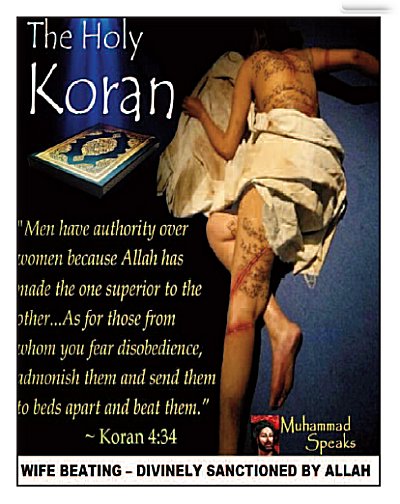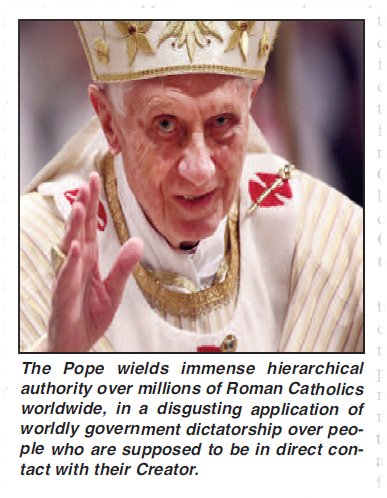 The Doctrine of the Nicolaitans
The Doctrine of the Nicolaitans
… Alive and Active Today!
I. The Word of God is a vibrantly powerful revelation of God’s truth that is applicable today just as it was centuries and millennia ago.
II. The manner of government within the ecclesia is spoken of forcefully in Scripture, and is so necessary to understand today because it defines our relationship with one another.
III. The doctrine of the Nicolaitans is closely related to the entire issue of government, and applies as much today as to the time when John wrote the Book of Revelation.
A. “Nevertheless I have somewhat against you, because you have left your first love. Remember therefore from whence you are fallen, and repent and do the first works, or else I will come unto you quickly and will remove your candlestick out of its place, except you repent. But this you have, that you hate the deeds of the Nicolaitans, which I also hate” (Revelation 2:4-6).
B. “But I have a few things against you [the church at Pergamos], because you have them that hold the doctrine of Balaam, who taught Balak to cast a stumblingblock before the children of Israel, to eat things sacrificed to idols and to commit fornication. So have you also them that hold the doctrine of the Nicolaitans, which thing I hate” (Revelation 2:14-15).
IV. Who were (are) the Nicolaitans, whom Christ hated so much, and what was (is) their doctrine?
A. Greek nikao, “to conquer or overcome” + Greek laos, “people”; thus, the word means “the conqueror of the laity”.
B. International Standard Bible Encyclopedia: “A sect or party of evil influence in early Christianity, especially in the seven churches of Asia. Their doctrine was similar to that of Balaam, ‘who taught Balak to cast a stumblingblock before the children of Israel, to eat things sacrificed to idols, and to commit fornication’ (Revelation 2:14-15). Their practices were strongly condemned by John, who praised the church in Ephesus for ‘hating their works’ (Revelation 2:6), and blamed the church in Pergamum for accepting in some measure their teaching (Revelation 2:15). Except that reference is probably made to their influence in the church at Thyatira also, where their leader was ‘the woman Jezebel, who calls herself a prophetess’ (Revelation 2:20; compare 2:14), no further direct information regarding them is given in Scripture.”
C. The Illustrated Bible Dictionary (Tyndale, 1980): “Nicolaus of Antioch (Acts 6:5) is supposed to have given his name to a group in the early church who sought to work out a compromise with paganism, to enable Christians to take part without embarrassment in some of the social and religious activities of the close-knit society in which they found themselves. It is possible that the term ‘Nicolaitan’ is a Grecianized form of the Hebrew Balaam, and therefore allegorized, the policy of the sect being likened to that of the Old Testament corrupter of Israel (Numbers 22). In that case the Nicolaitans are to be identified with groups attacked by Peter (II Peter 2:15), Jude (11), and John (Revelation 2:6, 15, and possibly 2:10-23), for their advocacy within the church of pagan sexual laxity. References in Irenaeus, Clement, and Tertullian suggest that the group hardened into a Gnostic sect.”
Note 1: Because John mentioned the followers of Balaam and the Nicolaitans separately, it is unlikely that the two groups were the same.
Note 2: The idea that Nicolas of Antioch (Acts 6:5) was the instigator of such an evil sect is contradicted by the fact that he and six others were “… of honest report, full of the holy spirit and wisdom”, chosen to oversee the daily ministration, one of whom was Stephen. Nicolas the deacon may be confused with another Nicolas, the bishop Nicolas of Samaria who was a heretic in the company of Simon Magus.
D. The most likely character of the Nicolaitans: “dominators of the members of the ecclesia, ruling over them as a separate, upper class of ‘pastors’ or ‘preachers’.”

1. This party ruled by a hierarchy of a ruling class over the rest of the people — like a corporate structure, as Satan does over men — developing a “pecking order” of fleshly leadership which Jesus clearly said He hates (Revelation 2:15).
2. This word, meaning “destruction of the people”, hearkens back to what is the earliest form of the priestly order or clergy which later on in church history divided people into the upper and lower strata, and allowed for leadership other than those led by the spirit of God.
3. This clerical system later developed into the papal hierarchy of priests and clergy lording over the flock. Yet, this system of hierarchies can be traced back to Nimrod, who was “… the mighty hunter before [in place of] the Lord” (Genesis 10:9). Actually, Adam and Eve originated the idea when they decided to make gods of themselves and decided what was right and wrong, by taking of the forbidden fruit in the Garden of Eden (Genesis 3).
4. The Council of Trent stated, “If anyone shall say that there is not in the Catholic Church a hierarchy established by the divine ordination, consisting of bishops, presbyters, and ministers, let him be anathema.”
5. The separation of the “clergy” from the “laity” is a great evil in God’s sight, and He hates the lust for religious power — or any other type of power — over others.
6. According to one commentator, “ There is an ungodly spiritual authority in the Church today, which is nothing more than the prideful spirit of control, manipulation, domination, and intimidation, and a rebellion of the rightful authority of God” (Jay Atkinson, The Latter Rain website).
V. God’s entire message contradicts the doctrine of the Nicolaitans.
A. We are all brothers of Jesus Christ and brothers of one another. there is no hierarchy within god’s ecclesia! (Romans 8:29; Hebrews 2:10-17; I Peter 2:17).
B. We are to serve one another in the Body with the gifts we have been given (I Peter 4:10; I Corinthians 12:12-24; Romans 12:5-8; Ephesians 5:21; I Peter 5:5).
C. Our care and love must be for others in the ecclesia (I Corinthians 12:25-26; I Peter 4:8-9; Romans 12:5, 9-10).
D. Of our own substance we must uplift others, especially those in the ecclesia (Romans 12:13; Galatians 6:9-10; I Timothy 6:17-19).
E. We must associate with those who are humble, and think of others as being better than ourselves (Isaiah 66:2; Philippians. 2:1-5; I Peter 5:5).
F. Jesus Christ admonished us to not strive for supremacy, but rather to be servants of one another (Luke 22:24-27; I Peter 5:1-3; Luke 9:48).
G. We are to look to Jesus Christ for our example, but ultimately exalt the Father, just as Christ did (Mathew 19:16-17).
H. Our entire approach to life demands that we serve, assist, and uplift those who are less fortunate, and are unable to help themselves and are in need; by serving these people we serve our Father in heaven (James 1:27; Isaiah 1:16-17; 58:6-7; Matthew 25:34-40).
I. Any vengeance that is due is to be doled out by God on evildoers; we are to do good in return for evil (Romans 12:17-21; Proverbs 25:21-22; Matthew 5:43-48).
J. God is “no respecter of persons” (Deuteronomy 10:17; II Chronicles 19:7; Acts 10:34; Romans 2:11; Ephesians 6:9).
K. Diotrophes in III John is an excellent example of someone in the ecclesia who practiced the doctrine of the Nicolaitans.

VI. It is clear that the hierarchical system of government amongst the saints, God’s sons, is of Satanic origin, typified by the corporate top-down structure of most organizations today. We are to live as brothers of Christ and of one another, and avoid the doctrine of the Nicolaitans, which God hates! The world says,
“A wonderful and horrible thing is committed in the land; the prophets prophecy falsely, and the priests bear rule by their means; and My people love to have it so: and what will you do in the end thereof?” (Jeremiah 5:30-31).
VII. Our sole head is Jesus Christ, our elder brother (I Corinthians 11:3). We have no righteousness of and by ourselves, we cannot save others, and we certainly are not to rule over the saints. We are to submit totally to the Father, and in the ecclesia we are to submit to others in humility, love, and service. This attitude is impossible if we differentiate between leaders and followers: as one Body we submit to one Head.
VIII. According to Jay Atkinson (The Latter Rain), “More than causing division, the problem with the question of authority has caused mass confusion. Yes, there is leadership in the church, but it is true leadership only if Jesus Christ is living through us. The problem is the fleshly leadership that has manipulated, controlled, and dominated the church, and brought it into the mess that it is in, and saturated it with the traditions of men and the doctrines of demons. Wanting to be a leader (overlord) in the church is a hard, bad habit to break. This is the Nicolaitan spirit. It injures and alienates the same ones that the church was supposed to have served and ministered to, not ruled over.”
IX. The consequences of Nicolaitanism throughout history are apparent everywhere around us. This system of repressive hierarchy has infected society ever since the Garden of Eden.
A. Marriage and family.
This attitude of rulership over others began in the Garden of Eden when Elohim told Eve,
“I will greatly multiply your sorrow and your conception; in pain you shall bring forth children; your desire shall be for your husband, and he shall rule over you” (Genesis 3:18).
rule over = masal, “to rule, govern, control.”
 This prophecy of the husband ruling over the wife has led to untold conflict and grief between husbands and wives, and has been woven into the fabric of many religions and cultural systems, such as the Moslem faith, where women are treated like chattel, as inferior creations compared to men. It has led to the upsurge of feminism and women’s rights movements, a response from women to break out of the repressiveness of what they consider male dominance, in a world where husbands do not lovingly head their wives, but rather dominate over them. The consequence of this dominance affects children as well, and feeds into the political systems that govern through fear and force, motivations that a top-down government control within the family reinforce on a national scale. The conflict in reality is between fear and love, greed and selfishness, repression and liberty.
This prophecy of the husband ruling over the wife has led to untold conflict and grief between husbands and wives, and has been woven into the fabric of many religions and cultural systems, such as the Moslem faith, where women are treated like chattel, as inferior creations compared to men. It has led to the upsurge of feminism and women’s rights movements, a response from women to break out of the repressiveness of what they consider male dominance, in a world where husbands do not lovingly head their wives, but rather dominate over them. The consequence of this dominance affects children as well, and feeds into the political systems that govern through fear and force, motivations that a top-down government control within the family reinforce on a national scale. The conflict in reality is between fear and love, greed and selfishness, repression and liberty.
B. Religious System.
It is impossible to separate religion from economy, because the industry, inventivenesss, and productivity of a people is directly related to their view of, and adherence to, the spiritual principles taught and believed by the people. Perhaps no other personality than Diotrephes typifies the Nicolaitan attitude within the ecclesia.
“I wrote to the church, but Diotrephes, who loves to have the preeminence among them, does not receive us. Therefore, if I come, I will call to mind his deeds which he does, prating against us with malicious words. And not content with that, he himself does not receive the brethren, and forbids those who wish to, putting them out of the church” (III John 9-10).
The Doctrine of the Nicolaitans was the real reason behind the Dark Ages (about 313 to 1517 A.D.) as the hierarchical control of the Roman Catholic Church pervaded all of society in most of Europe. According to Steven Lambert in Charismatic Captivation (Real Truth Publications, 2003),
“The demonic doctrines and practices devised and propagated by this corrupt corps of clerics [in Revelation 2] were deadly weeds of false teaching virtually identical to that being touted by the Discipleship proponents of today. It is also evident that, because those deadly weeds were not vigorously opposed and extirpated, but were instead permitted to spread through the Church, eventually the hyper-authoritarian Nicolaitan doctrines and deeds led to the hierarchical system of the Roman Catholic Church that took the Church into 1,200 long years of spiritual deterioration and devastation. The teaching of the Nicolaitans was the genesis of the concept that remains yet today in much of Christendom in which an elite class of professional clergy is set in as a hierarchical ecclesiastical government to in effect lord over the laity. The Nicolaitans taught and instituted a form of ecclesiastical hegemony (domination by force by one entity over another) based on a pyramiding, multilevel ascendancy structure comprised of priests, bishops, and cardinals, and so on, all of whom were under complete subjection to a singular religious potentate, whom was venerated as the human substantiation of Christ Himself — the Pope. The residual of this system today — still alive and well and revered by millions of adherents — is the Papal System of the Catholic Church.

“The Nicolaitan heresy was virtually identical in essence, as I said, to the Discipleship/ Shepherding doctrines and practices propagated by proponents and yet prevalent in the Post-Pentecostal church today. How much more significant that becomes when it is understood that it was primarily these perverse precepts and their propagators that were responsible for plunging the Church into the spiritual ‘black hole’ of the Dark Ages, from which the collective Church is still today in the process of recovery and restoration. The Dark Ages (313-1517 A.D.) was the period of the Great Apostasy for the collective Church, an occurrence prophesied by the Apostle Paul in I Timothy 4:1-2.
“During this age of spiritual darkness, the Truth was subverted by humanistic ideologies and vain philosophies (Colossians 2:8)…. Eventually, nearly every remnant of Divine Truth, the foundational teachings upon which the Church had been originally established, was distorted, debauched, diluted, degraded, abrogated, and abandoned. The prominent and preeminent role of the Nicolaitans in this cataclysmic and precipitous descent into comprehensive spiritual apostasy dramatically depicts the catastrophic consequence that ensues when false teachers are not exposed and their false teaching extirpated with finality. It is for this very reason that the Word of God warns, “A little leaven leavens the whole lump of dough’ (Galatians 5:9)”
C. Education and moral teaching.
Government education, which has been made compulsory in many countries, does more than simply teach the “3 Rs” of reading, writing, and arithmetic, which are essential to the efficient operation of any society. This education fosters obedience to the leaders of the country, expecially under dictatorial and authoritarian administrations like those of the Holy Roman Empire, Nazi Germany, Saudi Arabia, and more recently even the United States. The curricula are designed to support and strengthen the top-down leadership and suppress dissent by the citizens.
Hence, when the United States founding fathers wrote their foundational documents, such as the Declaration of Independence and the Constitution, they sought to build within the fabric of the new nation certain rights given to individuals by the very virtue of their birth — their God-given existence — of life, liberty, and the pursuit of happiness (earlier termed “property”). These founding fathers strove to avoid a kingly hierarchy by diluting governing power into three branches — legislative, executive, and judicial — and placed power into the hands of the people through an elected representation of non-career politicians. The Doctrine of the Nicolaitans, subtly taught in most public educational institutions for decades, has countered these liberating Biblical principles in a major way. Note the following.
“Nicholas taught that we need to compromise with our surrounding pagan society. Pergamos and Thyatira were some of the most sinister cities with regard to occultism and paganism. The Nicolaitans said it was hard for believers to live separately from all the pagan activities because they were the center of life in these cities. They asserted that it was alright to have one foot in both worlds. Guilds dominated cities like Thyatira. The best jobs were in industries where guild membership was required. The guilds opened all meetings with pledges to pagan gods and the occult. Union feasts, using pagan gods and loose moral practices, were normal for these high paying jobs. The Nicolaitans taught that it was a necessary compromise. They also would compromise with God’s inconvenient laws. They were in God’s eyes therefore anti-law. They taught a brand of grace that became a license to sin when you really wanted to get around a law” (www.icgarea4.com).
X. How to avoid the Doctrine of the Nicolaitanes.
A. Follow in the footsteps of Jesus Christ (I Peter 2:21; I John 2:6).
1. Keep the commandments (Matthew 19:17).
2. Pray, fast, meditate, and study God’s word (Matthew 6:5-13; Matthew 6:17; Psalm 1:2; 4:4; 63:6; II Timothy 2:15; Acts 17:10-11).
3. Love your brethren as yourself (Matthew 7:12; Philippians 2:1-5; John 15:12-13).
B. Be determined not to compromise with this world’s evil system, but resist its temptations by being proactive in doing the will of God.
“And do not be conformed to this world, but be transformed by the renewing of your mind, that you may prove what is that good and acceptable and perfect will of God.” (Romans 12:2).
“… as obedient children, not conforming yourselves to the former lusts, as in your ignorance” (I Peter 1:14).
“Do not love the world or the things in the world. If anyone loves the world, the love of the Father is not in him. For all that is in the world — the lust of the flesh, the lust of the eyes, and the pride of life — is not of the Father but is of the world. And the world is passing away, and the lust of it; but he who does the will of God abides forever” (I John 2:15-17).
C. Avoid any affiliation with religious or other groups that exhibit a hierarchical, Nicolaitan character where the leaders attempt to rule over you and bring you into obedience to themselves, and restrict the expression of your spiritual gifts.

